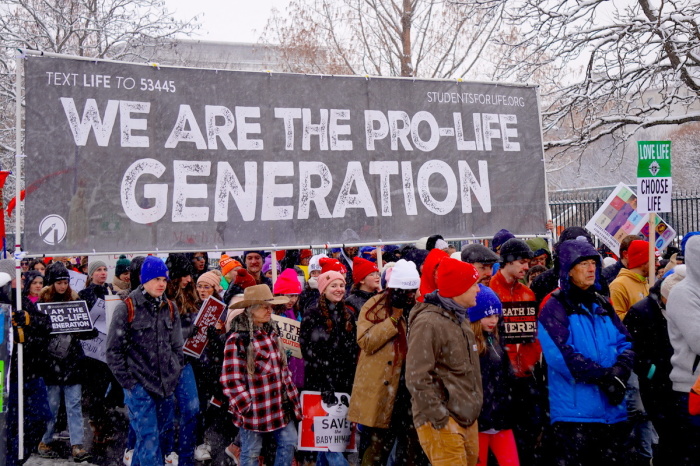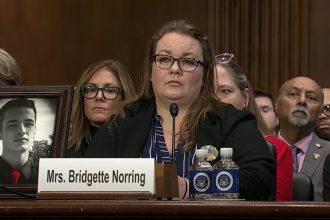
A new poll reveals that most young people support limits on abortion as voters belonging to the two youngest groups of American adults now constitute nearly one-half of the electorate in the United States.
The Demetree Institute for Pro-Life Advancement, a project of the pro-life advocacy group Students for Life of America, released a survey Monday based on responses collected from 1,485 voters between the ages of 18 and 42 from Jan. 6-10. The poll, which had a margin of error of between +/-2.5 and +/-3.0 percentage points, sampled the opinions of millennials and Generation Z, the youngest generations of adults in the U.S., when it comes to abortion policy.
Overall, two-thirds (67%) of respondents supported some restrictions on abortion. By contrast, only 9% of voters between the ages of 18 and 42 favored allowing abortions throughout all nine months of pregnancy for any reason, including in cases where babies survived botched abortions.
When asked what limits they would support on abortion, 63% of those surveyed said they would accept prohibitions on abortion after 12.5 weeks of pregnancy, while 66% answered in the affirmative when asked if they would support banning abortions after 24 weeks gestation.
In response to a question evaluating when respondents thought human rights began, 60% told pollsters they thought human rights began while unborn babies were still in the womb. Twenty-five percent insisted that human rights doesn’t start until after babies are born, while 2% expressed support for allowing a court to determine when human rights begin.
While most young voters supported abortion restrictions in some form, respondents were more divided when it came to providing taxpayer funding to the abortion provider Planned Parenthood. Forty-eight percent of those surveyed thought that Planned Parenthood should receive taxpayer dollars, and 37% took the opposite position.
When asked where they wanted to see the $700 million in taxpayer money given to Planned Parenthood go instead, 36% of respondents answered, “mental health care.” Other causes respondents wanted to see receive taxpayer money instead of Planned Parenthood include: “general healthcare and wellness services” (34%), public schools (32%), job creation (27%), prenatal and birth care (24%), abortion services (23%), assistance for at-risk families (20%), as well as law enforcement and crime prevention (17%).
Fifteen percent of those surveyed supported redirecting Planned Parenthood funding to “environmental restoration,” while 14% favored using the money for national defense purposes. The poll also revealed widespread reservations about Planned Parenthood’s efforts to provide “puberty blockers and hormone therapy” to youth exhibiting gender dysphoria, with 91% expressing concern that such treatments can permanently sterilize a minor.”
However, just 40% expressed opposition to Planned Parenthood providing such procedures, while 32% supported the abortion provider’s actions. The remaining 28% neither supported nor opposed Planned Parenthood providing gender transition procedures to trans-identified youth.
Another idea with widespread support among young voters was safety precautions for women seeking chemical abortions, also known as the abortion pill. Ninety-two percent of respondents expressed support for requiring women seeking chemical abortions to undergo ultrasound screenings, with 41% classifying ultrasounds as “extremely important.” Support was equally high for “blood testing to protect fertility,” with 39% calling it “extremely important.”
On the other hand, just two-thirds (66%) of young voters supported requiring women to see a physician in person before taking the abortion pill.
Nearly one-third of those surveyed (31%) told pollsters they would consider themselves “MORE WILLING to accept limits on abortion” if policies designed to help mothers and families care for their newborn children were enacted. Sixty-eight percent of young people who participated in the survey named “keeping healthcare costs for pregnancy and birth affordable” as a priority that is “most important for elected politicians to pass to support mothers, newborns, and families.”
Other proposals embraced by a majority of respondents include paid family leave for parents of newborns (66%), child health and development programs such as parenting classes and home visit programs (66%), education and support services that educate new parents about “childcare, health and child development” (63%), child tax credits (61%) and subsidies for child care for parents with young children (60%).
When it comes to whether or not a baby who survives an abortion should be allowed to live, nearly 90% supported providing necessary medical care to babies who are born alive. At the same time, two-thirds of those surveyed (66%) supported calling 911 in cases where a baby survives a botched abortion.
As Students for Life of America reported in a statement announcing the survey’s release, millennials and Gen Zers now constitute 48.5% of the American electorate.
Kristan Hawkins, president of Students for Life of America, pointed to the poll as a warning sign for the Democratic Party, which has heavily embraced allowing abortion throughout all nine months of pregnancy without limits.
“After a contentious election in which the Democratic Party offered basically one assurance, that the number of abortions would increase and that taxpayers would fund it, young voters pulled back,” she said. “Our poll details common ground, serious concerns, and bad news for Planned Parenthood, the nation’s number one abortion vendor.”
Ryan Foley is a reporter for The Christian Post. He can be reached at: ryan.foley@christianpost.com






